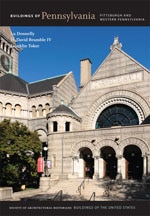In 1792, the commonwealth promised the area around Fryburg to the Holland Land Company, a group of wealthy Amsterdam investors, in return for their loans financing the Revolutionary War. The land company's agent, Harm Jan Huidekoper, came to the United States in 1805 and bought some of the properties for himself. In approximately 1820, he sold 184 acres to the Eisenman family, who knew the locale as “Kapp's settlement” and urged other Germans to join them. By 1835, there were about twenty families in the area, mostly German and Irish Catholics. For many years, German was the primary language of the town.
Farming and timbering predominated. Local timber, burned into charcoal, provided fuel for the fledgling iron industry in the 1830s and 1840s. The surrounding population swelled when a group of settlers from St. Mary's in Elk County migrated here to Kapp's settlement. In 1850, the town voted to change its name to Fryburg after Freiburg, Germany, where many of the first settlers were born. Two handsome stone houses from this time period in the 19000 block of PA 208 illustrate the prosperity of the town when the iron forges were operating. The red brick Washington House Hotel, originally built c. 1849 and rebuilt in 1879 after a fire (PA 4015 and PA 208 SE), with the frame Wayne Feed Mill across the street, provided much-needed services. In the 1880s, Fryburg's role as a supply town for the nearby lumber camps diminished when the narrow-gauge Foxburg-Kane railroad began hauling supplies to the lumber camps and exporting the lumber. As a result, many local jobs ended, and as the oil fields also were depleted, families moved to Oil City for employment.
Writing Credits
If SAH Archipedia has been useful to you, please consider supporting it.
SAH Archipedia tells the story of the United States through its buildings, landscapes, and cities. This freely available resource empowers the public with authoritative knowledge that deepens their understanding and appreciation of the built environment. But the Society of Architectural Historians, which created SAH Archipedia with University of Virginia Press, needs your support to maintain the high-caliber research, writing, photography, cartography, editing, design, and programming that make SAH Archipedia a trusted online resource available to all who value the history of place, heritage tourism, and learning.

